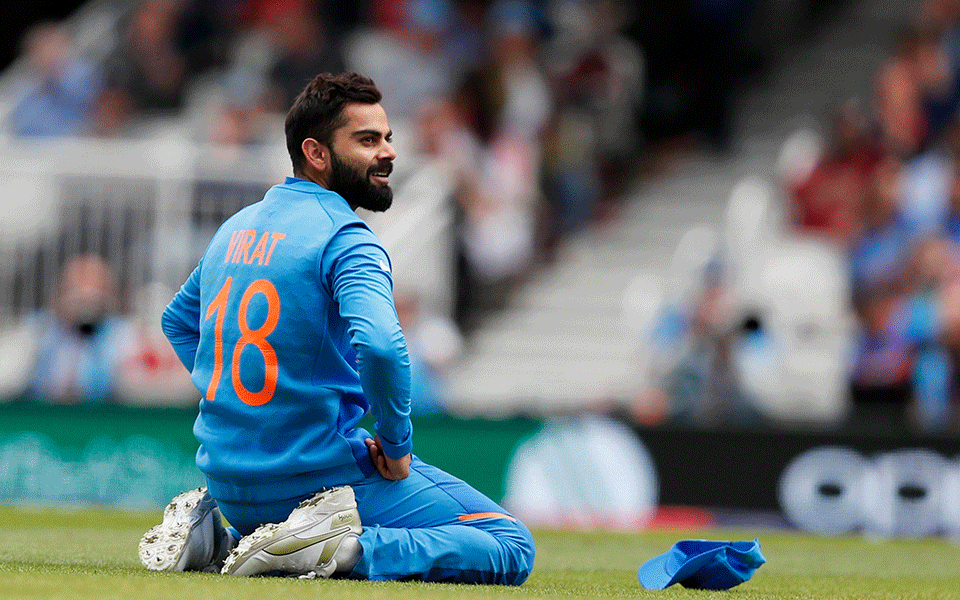Perth, Dec 20: Former Australia captain Allan Border defended Virat Kohli's aggression, saying cricket needs characters like the Indian skipper who exude passion on the field.
"There's not many characters in our game at the moment. The professional era has sort of beaten that out to a certain degree," Border said on Fox Cricket's podcast -- The Follow-on.
Kohli has received severe criticism from the likes of Mike Hussey, Mitchell Johnson and Sanjay Manjrekar for his aggressive celebrations in the ongoing Test series in Australia.
The Indian skipper was also involved in a series of heated exchanges with his Australian counterpart Tim Paine, which prompted umpire Chris Gaffaney to intervene during the second Test here.
"I haven't seen anyone sort of carry on so much as a captain when his side takes a wicket. It's really over the top but it's good in a way. You can see some passion about what he's trying to do," Border said.
Border added that perhaps Kohli's aggression stems from the desire to cement his legacy with an away series victory.
"He's so keen to win away from home and really deserve that number one ranking that's your KPIs (key performance indicators) as a captain I suppose," he said.
Under Kohli, India suffered two back-to-back away series defeats against South Africa and England this year.
"To drive the team to be number one, which he has achieved, but to win away from home is one of those important things you notice as a captain."
Border also opined that as the leader, Kohli feels the need to manifest the passion and drive.
"I think he's feeling that pinch. If you look at this Indian side he's probably the only one that has the character to get really animated," he said.
"The rest of the Indian boys are very good cricketers but seem to me a quiet bunch and maybe Kohli feels as skipper he needs to lead from the front and really show some passion and drive. I think it just comes naturally to him," he added.
Let the Truth be known. If you read VB and like VB, please be a VB Supporter and Help us deliver the Truth to one and all.
Hyderabad (PTI): Telangana Chief Minister A Revanth Reddy met Union Home Minister Amit Shah in Delhi on Wednesday night and urged him to increase the sanctioned strength of IPS officers to the state in view of its growing administrative and security needs.
The two leaders also discussed the recent surrender of several senior Maoist leaders before the Telangana Police and other issues.
"During the meeting, the two leaders discussed the issue of Maoist surrenders and their rehabilitation. The chief minister informed Shah that significant improvements in policing have taken place in Telangana over the past two years," an official release here said.
Highlighting that 591 Maoists have laid down their arms and joined the mainstream of society during this period, the chief minister said the state government was providing them compensation and rehabilitation assistance as per the rules.
He requested the Union home minister to extend financial support from the central government for development works in the backward regions of the state.
Reddy also urged Shah to increase the sanctioned strength of IPS officers to the state from 83 to 105 in line with the state's growing administrative and security needs, the statement said.
The first cadre review after the formation of Telangana was conducted in 2016, while the next review, due in 2021, was delayed and finally carried out in 2025. Even then, only seven additional IPS officers were allocated to the state, the chief minister informed Shah and requested that the third cadre review be conducted in 2026 as per the schedule.
Reddy explained that Telangana, like the rest of the country, is facing several modern challenges, including cybercrime, drug trafficking, white-collar crimes, and other emerging security threats.
He highlighted the reorganisation of the Hyderabad, Cyberabad, and Malkajgiri Police Commissionerates, the proposed formation of the Future City Commissionerate and the rapidly growing population in Hyderabad to underline the increasing administrative requirements of the state.





